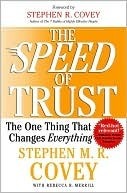More on this book
Community
Kindle Notes & Highlights
Think about it—people trust people who make things happen.
As Albert Camus said, “Integrity has no need of rules.”
Captain Jack Sparrow in the movie Pirates of the Caribbean, when he says: “I’m dishonest, and a dishonest man you can always trust to be dishonest . . . honestly. It’s the honest ones you want to watch out for, because you can never predict when they’re going to do something incredibly . . . stupid.”
The main reason why declaring intent increases trust is that it “signals your behavior”—it lets people know what to look for so that they can recognize, understand, and acknowledge it when they see it.
When leaders fundamentally don’t believe people can be trusted, they create systems and structures that reflect that belief, such as hierarchy, multiple layers of management, and cumbersome processes.
“When mores [cultural values] are sufficient, laws are unnecessary; when mores are insufficient, laws are unenforceable.”
“Only a small proportion of customers buy a company’s products because it is socially responsible. But if they think for a moment that you aren’t responsible, a much larger percentage will have a negative response.”
Businesses cannot succeed in societies that fail.


